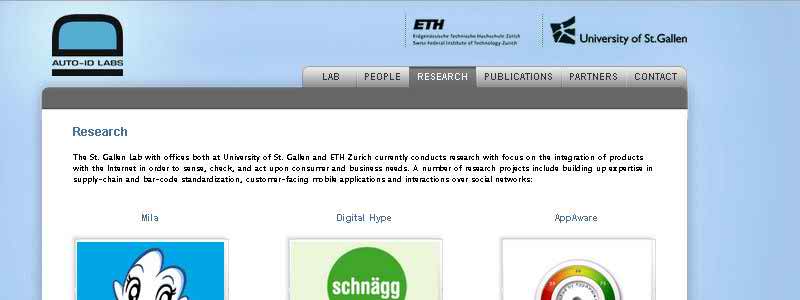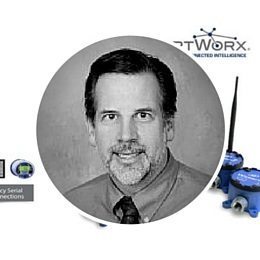Dr Florian Michahelles talks with us about consumer feedback loops, the key elements needed for the IoT to successfully integrate into our everyday lives, and the new values of our personal data.
This is the sixteenth segment in our Interview Series with some of the top people influencing the Internet of Things.
Interview:
Who are you, and what do you do?
Hello, my name is Florian Michahelles, I’m currently the head of the Auto-ID Labs research group at ETH Zurich. Together with five Ph.D. students we are exploring novel IoT applications for consumers. We are investigating this from both a technical and business perspective. Some examples so far include a shopping assistant, mobile car accident reporting system, and persuasive tools helping people to live a healthier lifestyle.
As part of the global Auto-ID Labs networking together with MIT, Univ. of Cambridge, Keio University and others we also develop an architecture for Internet of Things based on GS1 numbering standards.

Since your work and research often deals with everyday consumers, can you speak to how you see the IoT being integrated in users lives in a meaningful way over the next 5 years?
I believe that as the Internet has gained momentum via the spreading of Web/Blogs/Wikis into the masses, the same will need to happen in the IoT for it to have it’s full impact. However, we have yet to find the corresponding metaphors of blogs/wikis/social networks for the Internet of Things in order to drive this adoption.
A few key elements for the IoT in everyday life will be awareness and control. User’s mental models of what’s going to happen have to be supported. If I move a certain object and this triggers a digital activity, the user has to have the ability to inspect and find out what exactly is going on in that interaction. Also, the user has to have an understanding of where the data goes, what the data is being used for, and how to shut off the system. Finally, I can imagine IoT DIY markets opening up where you can go purchase parts and plug them together yourself at home. Arduino and some of these other platforms are a first step towards that direction for geeks, but this will have to become easier yet.
I see the IoT being integrated where it makes sense and where it advances from the status quo of today: today you can buy devices that measure the energy of single appliances, you can measure your water consumption, you can measure your heating. People have also started wearing more and more devices measuring their physical activities. Yet, currently all of these companies build their own single universe and want to sit in the center of the data flows. It’s a repeat of the old days when the mobile operators connected the phones to walled gardens rather than the actual internet. This will require new entrants to tear down these isolated kingdoms of platforms. Data has to be shared, processed and mashed – that’s the core of Internet of Things. We probably have a glimpse of how to do it technically, but we have yet to build the business ecosystems to support it.
You recently finished teaching a course on the business aspects of the Internet of Things, how do you see this element shifting in the near future for the topic as more and more companies enter the space?
Currently companies are putting one foot in front of the other. Most businesses move from online to mobile. From mobile to networked things is yet to come: you can go mobile fairly easily as coverage is literally everywhere. You cannot really go past this unless tagging, sensors, localization and access to this data is established.
I’m afraid I still have to to teach this course for a while before renaming it into Best practices of IoT business processes

How do you view the term “Internet of Things”?
The Internet of Things by itself does not really mean much other than having an Internet expanding into the real world. Also, I don’t see much value in developing a generic Internet of Things architecture. I see much more value in working applications, deriving communalities, and letting the business partners decide on standards. I see standards as more of an an evolutionary process than a thoughtful planning activity.
Where do you see the Internet of Things and its technologies creating the most impact?
I see the Internet of Things having an impact in areas where collective intelligence makes a difference to isolated personal experience. An Internet of Things should foster the sharing of best practices for every situation in life. How can I save energy? how can I move around most efficiently? where exactly do my goods come from? what’s the effect of my buying behavior on production conditions in far east? and how can it foster personal luck by providing appropriate nudges. I see additional impacts in complying with certain regulatory regulations such as carbon accounting, energy savings, and personal mobility patterns.
The industrial drivers of an IoT are gaining insights into the state, progress, efficiency of business/manufacturing processes. With long term observations and understanding, process could also be changed: not based on experience but rather based on facts.
Is there anything in particular you would like to see happen to speed this process along?
I would like to see Telco operators learning how to sell information and knowledge instead of raw data streams of bits. We have to get rid of these ridiculous roaming costs to really allow us to connect everywhere and at anytime. Furthermore, I’d like to educate consumers on understanding the value of their data. Instead of a focus on only privacy protection, a turning point would be to start treating personal data as a treasure that could be converted and traded for valuable services from others. As companies are selling their data, consumers should be able to do the same with their consent.
What are you currently working on or are most excited about?
I’m really excited about moving from augmenting things with eyes and ears to augmenting things with arms and legs.
Currently, I’m working on changing users’ behavior by providing them feedback about their activities of buying and consuming products. To this point, I was absolutely fascinated after recently visiting the Flying Machine Arena at ETH Zurich. The precision of these flying robots coordinating themselves speaks to a completely new dimension of letting information systems not only know about the real world but to also take effect.
Shout-outs: Any sites/people/articles or books that have inspired you lately?
Dan Ariely’s recent book The Upside of Irrationality: The Unexpected Benefits of Defying Logic at Work and at Home, the crazy doener copter (not sure whether it’s for real or fun), http://www.augmented-human.com/, and Google Glasses (still not sure whether they are real yet either).
Thanks for taking the time to talk to us.





